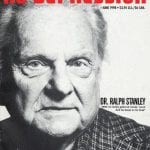Johnny Bush – Horse Opera
JB: I spent many a year watching Ray Price — how he could mesmerize a crowd. How he would take a brand new song and work on it for months, play it at different places, watch the crowd reaction, change it up a little bit, a word here and there, until he got it like he wanted it. Every night he gave me goosebumps. I just couldn’t wait until Ray got up to do his show. Of course, I’ve had the good fortune to work with some of the best. When Willie Nelson formed the band for the second time, he and Marty Robbins put this big tour together. I wish some of these new kids today would sit down and listen to Marty Robbins. And they’d hang their heads in shame. On this package show we had Bob Wills, in his last days he worked as a single, and I got to introduce Charley Pride on his first Texas appearance in Dallas. Nobody knew he was black. I knew it backstage, because I’d just met him. But Marty talked Willie into hiring him, and Willie didn’t know. And I’ve got to introduce him to that Dallas crowd, and you know what they done to Kennedy. So I said, “Here he is, ladies and gentlemen, Country Charley Pride.” And when he walked out with that guitar, the crowd just hushed.
DW: I bet he won ’em though, didn’t he?
JB: He said, “Ladies and gentlemen, I know I look funny standing up here to y’all. But don’t let this permanent tan fool you: I am a country singer.” And he got so strong over the course of the tour that nobody wanted to follow him. We had to move him on up. But it was Bob Willis, Charley Pride, Lefty Frizzell — I read somewhere where you went out to see him, like I went to see Hank Thompson.
DW: I was just a kid when dad took me over to see Lefty in Big Springs, back in ’46 0r ’47. We got there, and he wasn’t there. They told me they were passing the hat to get him out of jail. About an hour later he showed up. I can’t even remember what he sung, it was so far back.
JB: Back then you had Lefty and Hank Thompson and Hank Williams, Ernest Tubb. All these people were so far apart in their singing ability and their musical styles, that if you put the record on, it would turn three revolutions and you knew who it was. I dare you to do that today. I listen to 30 minutes and still can’t tell you who they are. There is no distinction from one to the other.
DW: It’s just chords and riffs.
JB: It is not the music anymore with those bands, it’s a marketing apparatus. How can we market this? Show me what this guy looks like. I don’t want to hear him.
ND: That’s what the nation at large thinks of as country music these days. How is country music different in Texas?
DW: We don’t play by their rules, most of us.
JB: We go by what feels right. Country to me is a feeling; it’s not some way to market something. It’s a tradition.
DW: And I’ve never been there where Johnny was recording, but I betcha the musicians constributed to what was going to go on that record. I mean, you didn’t just tell them you play this, you play that.
JB: That’s why today I still use Jimmy Day, because you don’t have to tell him anything. I’m glad you brought that up, Don. There are a lot of steel guitar players who can play every lick Jimmy Day and Buddy Emmons ever played. Because they learned it off the record, and they can play it, and it sounds good. Put that same guy in the studio, show him a brand new song, and say, ‘Okay, what have you got?’ and he’ll say, ‘Well, I don’t know.’ He has to wait until Jimmy or Buddy or somebody plays it.
ND: How important is it to keep the dance floor filled?
JB: Extremely important. I don’t think I’m doing my job if they’re not out there.
DW: It kind of scares me when they don’t. Like at the Broken Spoke, when I play there, the dance floor is always filled.
JB: It’s the old Ray Price/Bob Wills rule. If they’re not dancing, something’s wrong. You’re either playing too fast or not fast enough. The best way to do it is hit ’em with either “Faded Love” or “Release Me”, and if that don’t do it, go home.




